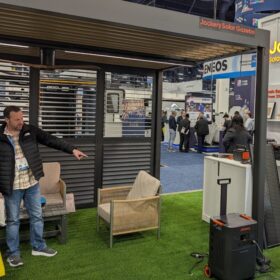The clean energy world let out a collective sigh of relief last night, when Florida Governor Ron DeSantis vetoed House Bill 741, a wildly unpopular piece of legislation dubbed the “anti-rooftop solar bill,” which would have phased down the value of net metering and opened the door for utilities to add fixed charges to solar customer bills.
And while the bill’s return to the legislature doesn’t mean it’s quite dead yet, having passed the first time by the exact same margin needed to override the veto, the belief is that DeSantis, a current frontrunner for the GOP ticket in 2024, wouldn’t have vetoed the bill if he believed in the possibility of an override, which could somewhat weaken his campaign.
In our previous coverage, we included commentary from the Solar Energy Industries Association (SEIA) and Vote Solar, however the conversation does not end with those two entities. pv magazine has collected a series of responses from other players across the political, regulatory, and industry spaces, and will continue to update this column with additional commentary points as they come out.
Florida SEIA
“The rooftop solar industry employs more than 9,000 Floridians and gives every Florida resident the freedom to choose how they generate and use electricity. Governor DeSantis understands the value of solar as an economic engine and a powerful tool for energy independence here in the Sunshine State,” said Justin Vandenbroeck, president of the Florida Solar Energy Industries Association. “His decision to veto this bill will allow our industry to continue growing and give more homeowners in our state the chance to lower their electric bills with solar.”
Energy and Policy Institute

Image: Energy & Policy Institute
Alissa Jean Schafer, a research and communications manager at the Energy and Policy Institute, commented on the genesis of the bill:
Smith said, “No monopoly utility owns the sun, nor the right to use misinformation to raise rates on their customers.”
CALSSA

Bernadette Del Chiaro, executive director of the California Solar & Storage Association, draws a correlation between the Florida bill and California’s NEM 3.0 controversy:
“Governor DeSantis did not fall for the utilities’ playbook of protecting their profits and monopolies by eliminating competition from rooftop solar. Governor Newsom’s administration should not fall for it either. When it comes to keeping solar affordable, growing, and contributing to our clean energy future, California should be not only keeping pace with Florida, but leading the world.”
Conservative Energy Network
Tyler Duvelius, director of external affairs, Conservative Energy Network applauds the protection of energy freedom in Florida:
“By vetoing this anti-net metering bill today, Governor DeSantis protected Floridians’ rights to energy freedom and ensured solar energy remains a strong economic force and job creator in the Sunshine State. Net metering gives Floridians access to clean, affordable energy and provides an element of choice and competition in the energy market. The practice reduces strain on the grid and diversifies energy sources, benefiting all energy consumers, not only those with rooftop solar.”
This content is protected by copyright and may not be reused. If you want to cooperate with us and would like to reuse some of our content, please contact: editors@pv-magazine.com.









A rooftop solar system that included 8,000 watts of solar used to cost $40,000.00 to install on a roof in 2014 without batteries and just an on-grid inverter at $5.00 per watt. Today, you can have one built for $2.50 per watt for the 8000 watts of solar and add 2 Tesla power walls (battery storage), a transfer switch and an inverter system that will power your home without going onto the grid or one that can switch onto or off the grid at will for the same $40,000.00. If such a bill does pass, to tax grid tied rooftop solar, all new rooftop solar would-be off grid to batteries and that could kill the utilities just like cellular phones are killing copper wired, land line, telephone service. What would really kill solar is eliminating the Federal Tax Credit that is the deal maker in rooftop solar sales that really helps in the pay back on the homeowner’s investment.
dont install too much solar panels just enough to skim off the highest tiered rate you pay by how many kilowatthours you use every billing cycle.. Just ignore the lowest tiered rate usualy for the first 300 kilowatthours you use at start of every billing cycle.. Figure how many solar panels you need based on top of the first 300 kilowatthours that are too low to give you payback as fast as the next higher tiered rate usually double the price rate as the first tier rate usualy at 10 to 15 cents each. The second tier rate are usualy 20 to 25 cents each the third tiered rate is usully 30 cents or higher.. Read your utiltiy statement and you will see tier price rates.. Dont let your rooftop contractor tell you that you should use all the kilowatthours at all tiered rates to figure out how many solar panels you need for your rooftop.. You may save a couple or three solar panels as unnecesary lower payback time .. and leave yourself with maybe 5 or 10 solar panels iinstead of more..
A homeowner needs to plan for FUTURE electrical needs. Switching to all electric for heating and cooling, hot water heating and any future Electric Vehicle or Swimming pool heaters would all help being powered from the rooftop solar rather than fossil fuels that will be more expensive to buy year over year. The smaller minimum will help in the short term for payback, but we also need to think about our future needs, so we don’t remain chained to fossil fuels.
just tell your rootop contractor that you want the fastest payback onthe fewest solar panels needed for that .. the contractor know how to figure it out for you.. Dont let him sell you too many solar panels that will average down yoru payback time with extra years!!
I have both an off-grid 8200-watt system plus a Tesla Solar Glass Roof of 7800 watt and the roof would be the exception to the rule of minimums because you cannot add more active panels/tiles to your roof later like you could do with solar panels. Instead, I figured the overage could replace my Natural Gas burning appliances as well. In 2021-2022 Winter season I used $500.00 less natural Gas replacing it with banked utility credited electricity. Since the utility only pays back 3 to 4 cents for unused electricity at “True-up” and the natural Gas heating equates to 5 to 6 cents in equivalent energy that can be substituted with the 3 cent excess energy as valued by the utilities. The off-grid system, that has batteries, costs about $1,000.00 per year in battery exchanges over the lifetime of the system plus the original investment of the solar panels. The battery/storage system costs twice as much and takes twice as long to get the pay back from so if one does not need the batteries because of frequent black outs, just installing solar to the grid has the fastest payback.